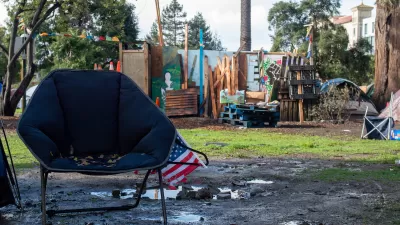Giving dogs the opportunity to play and socialize without restraint has its roots in the free speech movement in Berkeley, California.

Alissa Greenberg writes about the origins of the dog park, a phenomenon that started in Berkeley, California, in the 1970s, as municipalities started implementing stricter leash laws. In 1979, activists from People’s Park took over an empty lot in Berkeley that had been cleared for subway construction.
"[Tom Nigman] was happy to see that, along with the demonstrations and bail fund drives for arrested protesters common at People’s Park, the new space was frequently full of dogs playing and socializing—especially during a period when they were increasingly hemmed in," says Greenberg.
The area eventually became the Ohlone Dog Park, and resident Doris Richards led much of the effort to circulate petitions in support of the dog park, organize residents, and deal with disputes around zoning and noise pollution. As interest in dog parks spread across the country and the world, Richards became an important source of information and guidance for communities wanting to establish their own pet playgrounds.
Greenberg also delves into the impact dog parks have had on the urban landscape and development, particularly in terms of gentrification, and the shift in the role of dogs in everyday life over recent decades.
"In envisioning and creating public space for dogs, [Julie] Urbanik adds, dog park proponents and designers are building on this private idea of a more-than-human family to envision a new kind of public city. A family with children believes they deserve a playground; a family with dogs believes the same," notes Greenberg.
FULL STORY: How Dog Parks Took Over the Urban Landscape

Maui's Vacation Rental Debate Turns Ugly
Verbal attacks, misinformation campaigns and fistfights plague a high-stakes debate to convert thousands of vacation rentals into long-term housing.

Planetizen Federal Action Tracker
A weekly monitor of how Trump’s orders and actions are impacting planners and planning in America.

Chicago’s Ghost Rails
Just beneath the surface of the modern city lie the remnants of its expansive early 20th-century streetcar system.

Bend, Oregon Zoning Reforms Prioritize Small-Scale Housing
The city altered its zoning code to allow multi-family housing and eliminated parking mandates citywide.

Amtrak Cutting Jobs, Funding to High-Speed Rail
The agency plans to cut 10 percent of its workforce and has confirmed it will not fund new high-speed rail projects.

LA Denies Basic Services to Unhoused Residents
The city has repeatedly failed to respond to requests for trash pickup at encampment sites, and eliminated a program that provided mobile showers and toilets.
Urban Design for Planners 1: Software Tools
This six-course series explores essential urban design concepts using open source software and equips planners with the tools they need to participate fully in the urban design process.
Planning for Universal Design
Learn the tools for implementing Universal Design in planning regulations.
planning NEXT
Appalachian Highlands Housing Partners
Mpact (founded as Rail~Volution)
City of Camden Redevelopment Agency
City of Astoria
City of Portland
City of Laramie





























